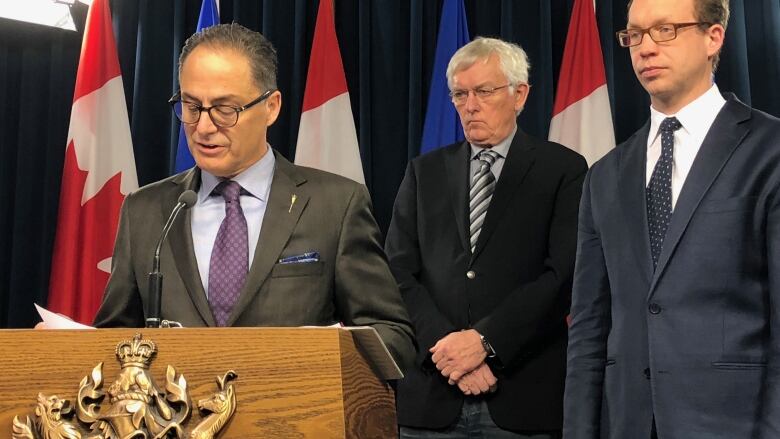Alberta university, college presidents' pay to face new limits
Bonuses and many perks are prohibited under new system

High salaries, bonuses and perks paid to some college and university presidents will be trimmed or eliminated under a new compensation plan unveiled Tuesday by the Alberta government.
Annual salaries paid to 20 of the province's post-secondary presidents will have to fall within five pay grids:
- University of Alberta, University of Calgary: $349,800 (minimum) to $447,000 (maximum).
- University of Lethbridge, NAIT, SAIT: $279,300 to $356,800.
- Athabasca University, MacEwan University, Mount Royal University: $238,700 to $305,000.
- Bow Valley College, Lethbridge College, NorQuest College, Red Deer College: $209,300 to $267,500.
- Alberta College of Art and Design, Grande Prairie Regional College, Keyano College, Lakeland College, Medicine Hat College, Northern Lakes College, Olds College, Portage College: $184,000 to $235,100.
The new pay bands will take effect April 15for new hires or contract renewals.Existing contracts will have to be in line with the new guidelines by April 14, 2020.
- U of A hires top American researcher, on condition daughter and her husband get jobs too
- University of Calgary professor tops salary-disclosure list with $737K in earnings
Once the pay bands are fully in place, the government estimates annual savings of $4 million to $5 million. The advanced education ministry is projected to spend$6.1 billion in the 2018-19 fiscal year.
"Institutions will be able to allocate the savings internally to benefit students and their campus," said Advanced Education Minister Marlin Schmidt.
Base salary isn't the only factor driving compensation for Alberta college presidents to the highest levels in Canada. The government is also cracking down on bonuses and perks.
The practice of paying bonuses will end, as will benefits such as free sports club memberships, signing bonuses and executive allowances.
Termination pay can be no more than four weeks of salary for each year of service, capped at a maximum of 52 weeks.
Pay decreases
Housing can only be provided if the university owns or rents the residence, and the president must pay rent at full market value.
The government is also prohibiting colleges and universities from providing executive or private health benefits.
Any vehicle provided to a president cannot cost more than $39,000.
The government is also putting limits on paid holidays, leave, parking and relocation expenses.
The changes mean college and university presidents will see their pay drop, though some will see a decrease of only about one per cent. The biggest cut will hit the president of Grande Prairie Regional College, whose salary will drop by 31 per cent.
- NorQuest College president gets one-month sabbatical each year
- U of A president should cut pay before charging students more, minister says
- U of A president peeved at minister's 'attack,' says pay cut was already in the cards
The pay grids will not apply to six institutions that do not fall under the Alberta Public Agencies and Governance Act: Banff Centre,Concordia University of Edmonton, The King's University, St. Mary's University,Ambrose Universityand BurmanUniversity.
The new compensation system is a result of the government's review of salaries paid to executives at Alberta's agencies, boards and commissions that started in the fall of 2015.
Last month, Schmidt attacked David Turpin, president of the University of Alberta, for earning $824,000 in total compensation while the institution hiked fees for residence and meal plans and tuition for international students.
Universities concerned
The people who chair the boards of Alberta's two largest universities expressed concern about how the pay grid would affect their efforts to recruit top talent.
Michael Phair, chairman of the U of A's board of governors, is taking a wait-and-see attitude butsaidthe university competes with institutions in Canada and the U.S. for suitable candidates, so a prohibition on offering a comparable salary could be a problem.
"It makes it a little more difficult for the board to negotiate and to exercise its role in interviewing and hiring their president," Phair said.
In 2016, University of Calgary president Elizabeth Cannon earned $631,042 in total compensation. Cannon announced she is stepping down this year and a search is underway for her replacement, whose pay will be subject to the government's new pay grid system.
Jill Wyatt, chair of the university's board of governors, called the new grid a "significant changein the terms and conditions of employment of university presidents."
"The president's compensation must reflect the duties of leading one of Canada's major research intensive universities, and the significant value and impact the president brings to our community, our province and our country," Wyatt said in a written statement.
"The board is in the early stages of a global search to recruit an outstanding individual to become UCalgary's next president and vice-chancellor. We will review the new compensation framework to determine how it impacts the terms and conditions for hiring the new president."
Mount Royal University's board of governors said in a statement it would comply with the government's new regulations.
"At the same time, the board of governors must balance the need to attract qualified leadership in an increasingly competitive and global academic sector," said board chairwoman Sue Mallon.












_(720p).jpg)


 OFFICIAL HD MUSIC VIDEO.jpg)
.jpg)



























































































